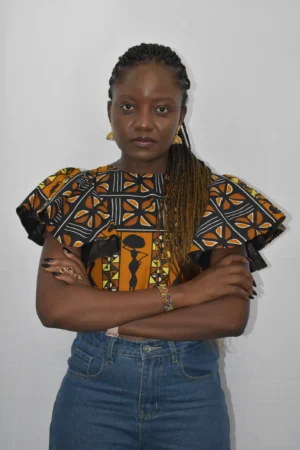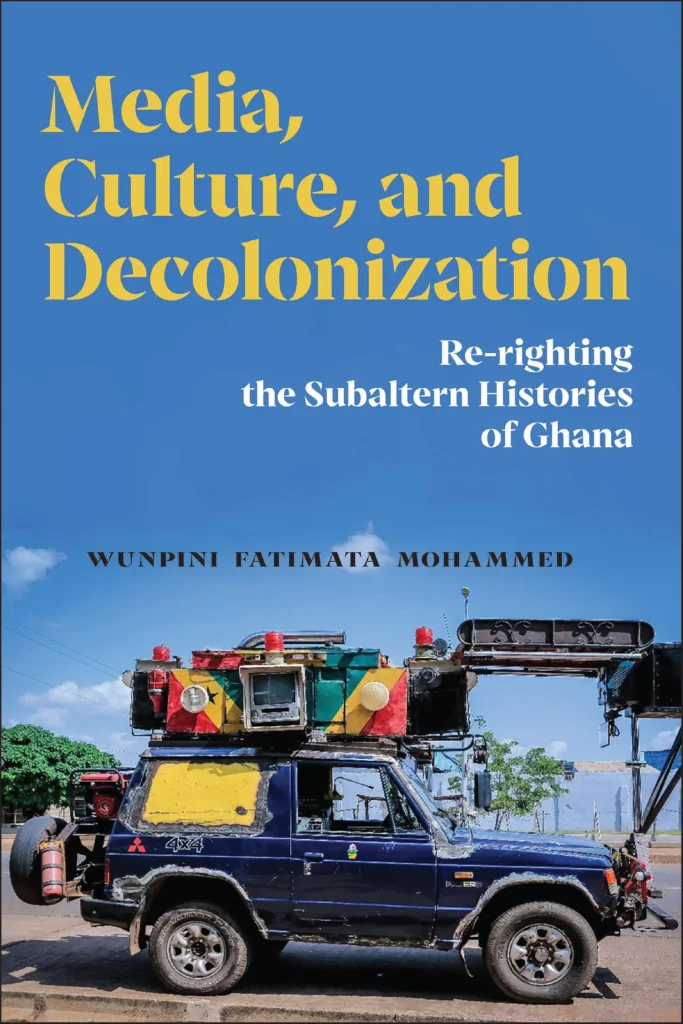“Television must assist in the socialist transformation of Ghana”

This piece is excerpted from Media, Culture, and Decolonization: Re-righting the Subaltern Histories of Ghana, to be published on 9th December 2025 by Rutgers University Press.
Even though Ghana Television (GTV) began transmission in 1965, it wasn’t until 1985 that Ghanaians had access to color television. And it was not until 1989 that one of Northern Ghana’s largest cities, Tamale, was connected to the national electricity grid. Following the connection of the North to electricity, well-to-do citizenry began to purchase TV sets to catch GTV broadcasts. Since only a small number of people could afford color TVs, communal television viewing was widespread. Owners of TV sets would bring them out into the compound at night. During the day, it was not uncommon to see children stand outside the windows of their neighbors’ homes to watch TV. Throughout the 1990s, GTV held a monopoly in the television space in Northern Ghana.
In his speech at the inauguration of the Ghana Television Service in 1965, Dr. Kwame Nkrumah, the first President of independent Ghana declared: “Ghana’s television will be used to supplement our educational programme and foster a lively interest in the world around us. It will not cater for cheap entertainment nor commercialism. Its paramount object will be education in the broadest and purest sense. Television must assist in the socialist transformation of Ghana.”
Alhaji Adam Cockra is a veteran journalist from Tamale who worked at Ghana Broadcasting Corporation for forty-two years, from 1966 to 2008. He recalls that when Northern Ghana eventually became a part of the television broadcast landscape, “a small transmitter was installed in Tamale to take care of the North. Staff in Tamale received by Ghana Airways what was telecast the previous day in Accra… In other words, everything viewers in the North saw on TV was a day old. Even then, only Tamale and its environs could view TV until the 1990s.” The rest of the North had no access to TV, demonstrating yet again the divide between Northern and Southern Ghana.
Despite these structural hurdles in bringing television to Ghanaians marginalized by location, ethnicity, and class, President Nkrumah’s vision for media in Ghana went beyond education and into the realm of consciousness raising: “Our broadcasting service should struggle ceaselessly to make itself the people’s service. It should identify itself fully with the people’s aspirations for a fuller life. It should continue to fight uncompromisingly against the forces militating against our progress. It will be its task to expose and unmask imperialism, colonialism and neocolonialism in all its forms and manifestations, and support our endeavors for the political unification of our Continent.” Made at the time when African countries were fighting for liberation from colonial rule and the African diaspora in America was fighting for civil liberties, this statement is still relevant today.

Sadly, Ghana’s media organizations and media watchdog organizations have slacked on this mandate, departing significantly from Nkrumah’s vision. From 2018 to 2022, Anne Sophie Avé, the French ambassador to Ghana, hosted a program called Touch of France that was broadcast on GHOne TV and Metro TV, both private commercial stations. French propaganda and soft power were promoted in the guise of cultural exchange, a development that Nkrumah might have described as a neocolonization of the media landscape.
The US embassy was a major sponsor for the twenty-seventh Ghana Journalists Awards, held in October 2023 in Accra. It is therefore no surprise that journalism in the country today has failed to challenge the presence of an American military base whose resident US soldiers enjoy more rights than Ghanaian citizens. For example, US soldiers do not need passports to enter Ghana. Ghanaian journalist Kwesi Pratt Jnr, who reviewed the US-Ghana defence agreement, has shared that “If US soldiers kill Ghanaians and destroy their properties, the US soldiers cannot be tried in Ghana. Ghanaians cannot sue US soldiers or the US government for compensation if and when their relatives are killed, or their properties are destroyed by the US Army or soldiers.”
In addition, the embassies of Global North nations occupy an integral position in Ghana’s civil society. Not only do they fund research, and organize and fund journalism training workshops, they also wine and dine media movers and shakers, stifling journalistic independence. In 2020, the French embassy and other French institutions organized a training workshop for Ghanaian journalists on the promotion of French language use on the radio airwaves and in the public sphere. In 2022, the US organized and funded a fact-checking workshop for rural journalists in Ghana. Ahead of Ghana’s recent national elections in 2024, the US embassy worked with the Ghana Journalists Association to organize a workshop for journalists on election reporting.
Another departure from Nkrumah’s vision for Ghana’s television sector is the lack of gender parity. Key aspects of television development were shaped by Pan-Africanists like Shirley Graham Du Bois from the United States and Genoveva Marais from South Africa. Marais served as director of programs for the television service at its inception. She introduced and shaped programming toward the Pan-African and socialist vision which laid the foundation of the Ghanaian Broadcasting Corporation. Yet in Ghana’s television stations today, only thirty percent of management positions are held by women, according to the Media Foundation for West Africa. Gender discrimination is rife, and TV workplace culture does not support and mentor women to rise in the sector. Gender representation on television has wildly departed from the Pan-African, anticolonial values that underpinned the early days of TV development. The male gaze dominates television representations. Media narratives on gender objectify women, and report sexual and gender-based violence through victim-blaming frames. Men outnumber women ten to one as experts on major programs on radio and television.
Mainstream media in Ghana today is thus a far cry from what Dr. Kwame Nkrumah envisioned. Ghanaian media organizations have gradually lost the pan-African, anti-colonial, feminist values that guided the ethos and programming of the Ghana Television Service.
WUNPINI FATIMATA MOHAMMED was born and raised in Tamale, Ghana. She is an assistant professor in the Department of Communication at Cornell University. She is coeditor of African Women in Digital Spaces: Redefining Social Movements on the Continent and in the Diaspora (Mkuki na Nyota, 2023).



